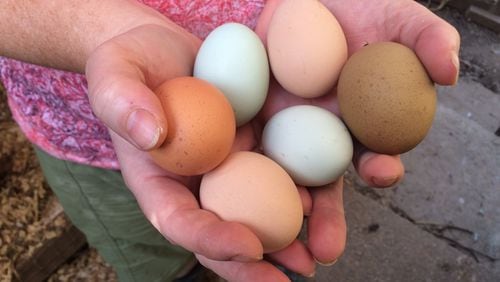Anne-Marie Anderson loves her chickens — she’s given them all names — but occasionally one of them has to go to “freezer camp.”
That’s a mordant reference to what happens when a rooster or a nonlaying hen gets culled from the flock.
How to negotiate the emotional politics when yesterday's feathered friend turns into today's supper? Anderson will deal with that and other poultry questions at a "Chicks in the City" symposium being planned for this fall by the Atlanta History Center.
(Because of concerns about avian flu that surfaced last fall, the Wylde Center, Decatur’s community garden, decided this year not to conduct its familiar tour of backyard coops, in an effort to reduce contact between different coops and to forestall a possible spread of infection. It turns out, Anderson said, that the avian flu has made few inroads in Georgia. Nonetheless, organizers want to stay on the safe side.)
Anderson’s flock of 13, including a loudmouthed black cooper maran rooster, looks cheerful enough as they strut around the backyard of her home in Decatur. She speaks to them by name — a snowy white rock named Wilma; Olive, a speckled Ameraucana — and occasionally cradles them in her lap.
Fetching eggs from their coop on a recent sunny day, Anderson demonstrated the beautiful variety of colors that they produce, from eggs that are a pale blue, to dark brown to an olive green. Her hens create an Easter-worthy palette of colors, and it has something to do with the fact that they can wander the yard, eating bugs and weeds as they please.
Many Atlantans may get started in suburban chicken husbandry this time of year, when warm days provide optimum growing conditions for young chicks. Anderson suggests those interested check the laws in their area. Not every part of town permits the poultry.
Getting her chickens to come back to the coop at night is not a challenge, Anderson said. They long for the protection. “They have to be aware of safety,” she said. “They are the bottom of the food chain.”
Anderson has a few suggestions for urban homesteaders who want to raise their own brood:
• Get buy-in from your neighbors. Roosters aren’t as loud as barking dogs (or leaf blowers) but they can disrupt neighborly harmony. Anderson shares her flock with her next-door neighbors, and they constructed the coop between the two houses.
• Must you have roosters? No. Hens will lay eggs without a rooster in the house.
• Build the coop first. You’d be surprised how fast those little balls of fluff are transformed into baby dinosaurs, Anderson said.
• Talk with your children about whether these chickens might end up on a plate. Anderson's daughter Scarlett was fine with it — "It's the circle of life, Mom" she said, with a roll of the eyes. But others might not be so sanguine. (Intrepid Atlanta Journal-Constitution food writer Ligaya Figueras had to deal with the same challenge before finally finding a happy ending by giving a couple of chickens away.)
• How big should your coop be? Don’t be too stingy. Chickens, Anderson said, are like children. “The more room they have, the more things they have to play with, the less trouble they get into.”
• Don't kiss your chickens — you could be dosing yourself with salmonella. For that same reason, you don't want your chickens pooping in the house. "That's unhygienic."
Chickens tend to lay about two eggs a week, more in the spring and much less in the winter. Eggs from backyard chickens are not only more colorful, they have harder shells and brighter yolks. They are also, it goes without saying, fresher. Eggs in the store can be 30 days old.
About the Author







